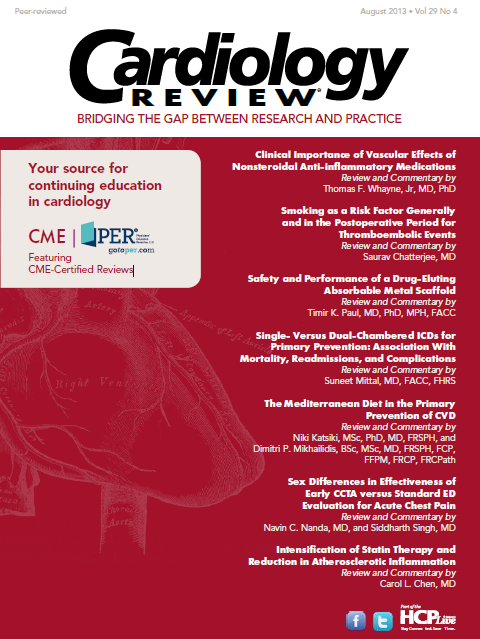Publication
Article
Cardiology Review® Online
News & Trends
OR Teamwork Increases Patient Safety
Cardiac surgical teams should be trained to improve communication and teamwork, and hospitals should establish robust quality assurance systems to identify and correct safety hazards, according to a new recommendation from the American Heart Association (AHA) put forth to help reduce preventable mistakes in the cardiac operating room. The AHA statement was published online August 5, 2013, in the association’s journal, Circulation.
The AHA Scientific Statement reviewed evidence- based research about communication within and between surgical teams, the physical workspace, and the organizational culture of the cardiac OR. The statement’s authors said that the critical elements of teamwork can be summarized by the following Six C’s:
- Communication
- Cooperation
- Coordination
- Cognition
- Conflict resolution
- Coaching
Highlights from the statement include the use of checklists and briefings prior to each surgery, followed by postoperative briefings; the development of institutional policies to define disruptive behaviors by medical professionals; and transparent, formalized procedures for addressing unacceptable behaviors. Establishment of an institutional culture of safety through the implementation of a robust quality improvement system that uses input from all team members will also help to continuously identify and correct safety hazards.
To view the statement in Circulation, visit: http://circ.ahajournals.org/content/early/2013/ 08/05/CIR.0b013e3182a38efa.full.pdf+html.
NHLBI, ACC, and AHA Jointly Issuing Guidelines
The National Heart, Lung, and Blood Institute (NHLBI) invited the American College of Cardiology (ACC) and the American Heart Association (AHA) to assume the joint governance, management, and distribution of 5 clinical practice guidelines focused on cardiovascular prevention. The guidelines will provide recommendations on hyperlipidemia, hypertension, cardiovascular risk assessment, cardiovascular lifestyle interventions, and obesity.
The announcement was made in an editorial authored by leaders from the NHLBI, AHA, and ACC that was published online August 8, 2013, in JACC and Circulation.1 The editorial discussed the existing collaboration between NHLBI, ACC, and AHA on clinical practice guidelines and development of performance measures. In June an essay published in the same journals announced NHLBI’s intent to refocus its clinical practice guideline development process and adopt a new collaborative partnership model in response to what it termed “profound changes in the health care landscape.”
The joint ACC/AHA Task Force on Practice Guidelines will provide oversight and staff support, and NHLBI will support further systematic evidence review as needed. All chairs and members of current writing panels have been invited to continue to work together with the ACC and AHA to finalize the guidelines.
References
1. Gibbons GH, Harold JG, Jessup M, Robertson RM, Oetgen WJ. Next steps in developing clinical practice guidelines for prevention. JACC. Published online August 8, 2013. doi:10.1016/j .jacc.2013.08.004.
FDA Advisory Panel Recommends Approval of New Pulmonary Hypertension Drug
An advisory committee to the FDA voted unanimously to recommend the approval of riociguat (Adempas, Bayer Healthcare) for the treatment of 2 types of pulmonary hypertension: to improve exercise capacity and World Health Organization (WHO) functional class in chronic thromboembolic pulmonary hypertension (CTEPH, WHO group 4) and to improve exercise capacity and WHO functional class and delay clinical worsening in pulmonary arterial hypertension (PAH, WHO group 1).
Riociguat is an oral soluble guanylate cyclase stimulator that can potentiate nitric oxide pathways.
Panelists felt the data presented in support of riociguat were convincing and showed efficacy and acceptable safety, and a positive risk/benefit profile. The panel recommended, however, that the concomitant use of nitrates be contraindicated.
Data were from the results of 2 randomized, controlled trials: Pulmonary Arterial Hypertension Soluble Guanylate Cyclase-Stimulator Trial 1 (PATENT-1) and Chronic Thromboembolic Pulmonary Hypertension Soluble Guanylate Cyclase-Stimulator Trial 1 (CHEST-1). In both studies the drug significantly improved both pulmonary-artery hemodynamics and exercise capacity over 12 to 16 weeks.






